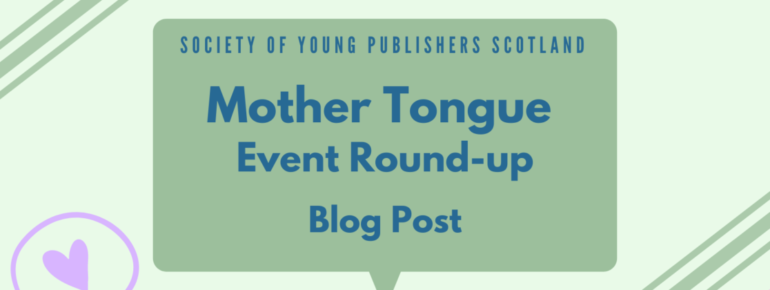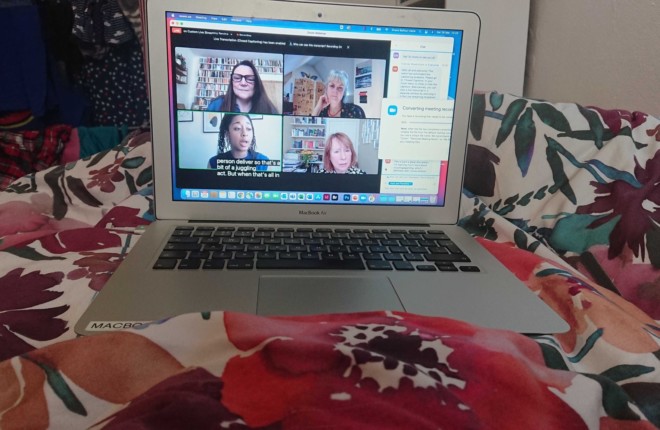
Mother Tongue: Publishing Beyond English in the UK and Ireland – Event Round-up
Posted on June 30, 2021 in Scotland

SYP Scotland’s June event – in collaboration with SYP Ireland – was Mother Tongue: Publishing Beyond English in the UK and Ireland, in which the panel discussed publishing in minoritised languages across the UK and Ireland. These languages included Scottish Gaelic, Irish, Welsh, and Scots!
__________________________________________
The panellists that took part were:
Ishbel McFarlane – CHAIR (she/her)
Ishbel McFarlane is a writer/performer in Scots and English. Her play, O is for Hoolet, won the Platform 18 award, toured 2015-2019, and was published in 2020. Earlier this year she published a podcast series about the poet Edwin Morgan.
Twitter and Facebook: @IshbelMcF
Lefi Gruffudd at Y Lolfa (Welsh) (he/him)
Lefi Gruffudd is head of publishing at Y Lolfa and has been at the company for over twenty years. He graduated in History and has a Masters in Librarianship from Aberystwyth University. He’s also a weekly columnist for the Western Mail and enjoys cycling.
Twitter: @lefigruffudd
Anne Glennie at Cranachan (Scots) (she/her)
Anne Glennie founded Cranachan in 2016, enabling her to combine her love of language, learning, and books. She is also a literacy consultant and author and shares her office with two guinea pigs called Wilbur and Melba.
@anneglennie
Twitter and Instagram: @cranachanbooks
Sandra Corbett at Acair (Scottish Gaelic) (she/her)
Sandra is the Marketing and Communications Officer at Acair, originally from the Isle of Lewis. She is an avid reader and learner of languages, and speaks French and Spanish as well as learning German and Russian. She has previously worked for the National Library of Scotland and MG ALBA in development.
Tadhg Mac Dhonnagáin at Futa Fata (Irish) (he/him)
Tadhg Mac Dhonnagáin is a publisher and writer and the founder of children’s publishing house, Futa Fata. The company has more than 100 titles in print, both original Irish-language books and translations. Futa Fata books have been translated into fifteen languages worldwide.
Twitter: @tadhg_mac_dh @futafata @barzaz_ie
__________________________________________________
Our chair Ishbel kicked off proceedings by introducing our panellists and then asking each of them how their work reflects the culture and language that their companies represent.
Tadhg of Futa Fata noted that they publish mostly in Irish: a niche in the country’s publishing industry, but a healthy one. He went on to state that there are approximately 75-80,000 daily speakers of the language and that Irish has been taught as a compulsory language in schools for over 100 years. Furthermore, 1.7 million people in Ireland have some knowledge of Irish. There is a great positive feeling about the language in Ireland and since Futa Fata started 15 years ago, Tadhg believes this has only increased. The additional facts that Irish people are book lovers and that the Irish book market is pretty strong have only contributed to the business.
Next up was Sandra from Acair, who publish mostly Gaelic books alongside some English and Scots ones. 60-70% of Acair’s books are in Gaelic. Acair originated as part of the Bilingual Education Project in the Western Isles as there was deemed to be a lack of Gaelic books available. The publisher provides schools with Gaelic books and has a contract with the Scottish Book Trust where they publish roughly 16 books a year for young children. Schools get annual book packs consisting of these titles. Scotland’s last census showed approximately 60,000 Gaelic speakers and Sandra has noticed a growth in access to Gaelic learning in schools which she sees as a bonus. The downside of this is that children will only be exposed to the language in school and not so much at home or in the community.
Cranachan’s Anne (and her vocal guinea pigs) commented that Cranachan mainly publish in Scots and English and that their target market is children and YA. The majority of their books are set in Scotland so they often feature Scots and even some Gaelic: although this is minimal, as Anne is not fluent.
Lefi, from Y Lolfa, told us that they publish mostly in Welsh but have recently increased their English output. Lefi’s father started the company to promote the Welsh language and its origins were in a satirical magazine akin to a Welsh Private Eye. There are about 500,000 Welsh speakers in Wales, so their yearly output has increased to 40-50 books. Lefi believes that Welsh publishing is in a very positive situation. Y Lolfa prides itself on their original fiction and nonfiction.
The panel then moved on to discuss the differences between publishing in English and publishing in these minoritised languages. Tadhg mentioned that 85% of the books sold in the Republic of Ireland’s bookshops are imported from the UK. The remaining 15% are from Irish publishers and the Irish language is part of this 15%, so the books are there. Tadhg doesn’t believe that publishing in Irish is that much different except for smaller print runs and less press interest. Futa Fata’s first runs are normally 1500-2000 copies while Irish translation of English works are slightly higher at 2500-3000. Press interest is, happily, increasing due to social media and a new generation of journalists who are more willing to review books in Irish.
Ishbel then directed the conversation to Anne and asked about the challenges of publishing in Scots since it is a non-standardised language: although this is shifting. Anne confided that it is actually beneficial to publish in Scots as they then have access to grants. She went on to say that there have not been any particular challenges just for publishing in Scots. It is its own language, but its close proximity to English means Cranachan are not in the exact same situation as the other publishers. There is still work to do, Anne admitted, and attitudes that need to be set right. An example of this is Shuggie Bain, which recently had a review complaining about the use of Scots as “slang”. However, Scottish schools are improving their teaching and inclusion of the language.
The same question was asked of Y Lolfa’s Lefi: are there challenges in Welsh language publishing? Lefi commented that publishing in Welsh is easier and doing better than English language publishing in Wales. The reason for this is that the sector is community-based and people are pro-independent bookshops, with people and schools actively looking for Welsh content. Referencing Tadhg’s comment about 85% of books in Irish bookshops being from the UK, Lefi said that it is more like 95% in Wales so it is difficult to compete if you are publishing in English.
Sandra from Acair was then asked if the excellent digital audio output (available alongside their physical books) enhances Gaelic publication, as readers can hear how the language is actually spoken and pronounced, or if there were any other developments that help minoritised language publication. Sandra believes audiobooks are crucial – especially for learners and the parents of school learners. For many of Acair’s physical titles, Stòrlann – a Scottish government-funded body – publish supporting audio files. Acair also have some audiobooks of their own and have seen downloads worldwide, showing the company that they are having an impact.
Ishbel then asked the entire panel to provide one piece of advice that they wish people knew about minoritised language publishing.
Tadhg: “It’s a real-world thing, it’s growing and there’s excitement about it”.
Sandra: “Don’t bother about getting the Harry Potter rights! Been there, done that, didn’t get the t-shirt.”
Lefi: “It’s a vibrant living culture, it’s not something we do as a hobby. We live it”.
Anne: “It’s important work. It’s rewarding work”.
This was then followed by our Q&A! The first question put forward was: do the panellists know if their books are being purchased by libraries? Is there anything in place to encourage libraries to acquire minority language books? Sandra said yes, especially in the Western Isles. Acair have a friendly relationship with local librarians and they send librarians AI sheets of their newest titles. They are very good at buying not just English books but Gaelic books too. Futa Fata see libraries as an important market and Tadhg said that they have worked hard to develop relationships with Irish libraries.
The next question was: are any genres favoured when publishing in minoritised languages? And due to an apparent lack of nonfiction titles, are such languages not taken seriously as an academic language? Anne responded to the latter part of this question by saying they don’t do much nonfiction at Cranachan but cited Scotland Street Press’ book Wilson’s Ornithology and Burds in Scots as an excellent example. Yet it is definitely a neglected sector in Scots publishing. Sandra mentioned that there are some Gaelic nature books for children but there is not nearly as much Gaelic nonfiction as Gaelic fiction. There is a nonfiction scene in Wales said Lefi: most things are covered in Welsh language publishing. This was helped by the first few years of devolution, as there was an extra £1,000,000 given to the sector. If there are any gaps in the industry, they have grants to help fix this.
Our Chair Ishbel’s father then sent in a question about government financial support for publishing in minoritised languages and how necessary it is. Y Lolfa have had government funding and Lefi deems grants necessary to publish the works that they want. Scottish Book Trust funding has made a similar impact on Cranachan’s work and Anne mentioned that she can see how it has helped original Scottish work be published throughout the industry in Scotland. Futa Fata also receive funding, including from the Arts Council of Ireland, which helps them to be ambitious with their original work.
Another question was about spelling and consistency in minoritised languages: did the panellists have style guides? Regarding Scots, Anne likes to keep it consistent. This is something Cranachan learnt the hard way with Ross Sayers’ books in particular: each book featured more Scots and they wish that there had been a style guide implemented for Ross’ first book. At Acair, they use the Gaelic Orthographic Conventions for books that are going to schools. Their other titles contain a range of dialects and spelling variations are present. Lefi mentioned that there are many differences in Welsh but that they embrace it. He also added that people do understand the differences but may pretend not to! Futa Fata uses the standard written Irish but has space to include other dialects. There is also a slight difference between the Republic and Northern Ireland’s written Irish. Tadhg told us that Futa Fata use footnotes in some novels aimed at children, such as if it is written in Western Irish which has its own expressions. He believes in the importance of teaching children about other dialects.
And that was our Mother Tongue: Publishing Beyond English in the UK and Ireland event! Thank you again to the fantastic panellists, our Chair Ishbel, and SYP Ireland. You can follow us @SYPScotland and @SYPIreland on social media for updates on our next events.



 Listen to the podcast
Listen to the podcast  Explore the Youtube channel
Explore the Youtube channel